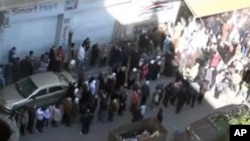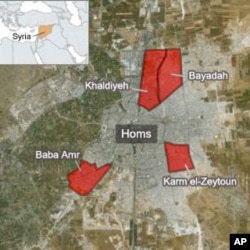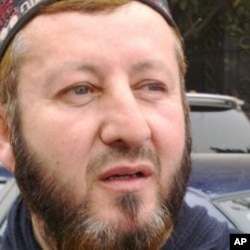Syrian security forces have resumed their crackdown on the protest hub of Homs and other cities, a day after authorities in Damascus rejected an Arab League plan calling for U.N. peacekeepers.
Activists said tank fire and artillery shelling hit two rebel-held Sunni Muslim neighborhoods in Homs that have spearheaded the 11-month uprising against President Bashar al-Assad. Opposition groups also reported clashes between government troops and army defectors in the central city of Hama and southern Daraa province.
Amid the continuing crackdown, Syrians are suffering not only from the violence but an economic free fall that threatens to undermine whoever will rule the country in the coming months or years.
Activists and humanitarian groups have been trying to get desperately needed aid to the hard-hit cities of Homs and Hama, where basics such as food, drinking water, and medicine are in short supply.
Economic situation
But even in areas spared the heaviest of fighting, the economic situation appears grimmer by the day. A Syrian exile in Cairo, Zakaraya Daba, says relatives in his hometown Aleppo face troubles just carrying out their everyday tasks.
Daba says there are no jobs, no heating fuel and limited food supplies. He says the economic situation is deteriorating but that those he calls the “ruling gang” do not care.
Across Syria, prices for basic commodities have skyrocketed - with bread briefly doubling in price, and other foodstuffs holding steady at 50 percent more than before the uprising began nearly a year ago.
Simultaneously, the value of the Syrian currency has plummeted, while international sanctions have disrupted basic economic transactions such as ATM and credit card use.
While some in the international community are considering tougher sanctions, Nadim Shehadi of London-based Chatham House says that may not be the answer.
“Sanctions in a way are always difficult to implement and, especially, neighbors who have long relations with the country always find loopholes to overcome sanctions. So this is normal and sanctions are not really enough."
Black market
Even visitors to the Syrian capital can get around the restrictions - a black-market business using bankers in Lebanon provides foreign currency. Certainly the government would have no problem countering sanctions on a larger scale.
Those workarounds have been helpful to some in Damascus with even minimum connection to the government. One resident, who asked not to be identified, said Monday that the situation was still holding up, and he was able to find food and gasoline.
He said electricity is sometimes cut, but he blamed that on rebels cutting fuel lines supplying the capital's power grid.
The Syrian government also blames “armed extremists” for attacks interrupting supplies. The opposition, in turn, blames the government, with both claims difficult to verify.
It is also hard to determine what the economic hardship will mean in the near term; the troubles appear to reinforce the positions of people on both sides.
Syria Photo Gallery
Infrastructure
But Chatham House analyst Shehadi says one thing is clear: damage to infrastructure hurts everybody, including the opposition.
“One has to think at the same time of the transitional period in the future where whatever damage you do now will have to be repaired, so you are doing damage to yourself, because the regime is going to go eventually."
How long, if ever, that “eventually” takes, poses another problem, Shehadi says: the longer the situation continues, the worse the economy and the violence will get.
Rights activists say hundreds have been killed in Homs since the government began bombarding opposition-dominated areas in the city on February 4.
British reaction
British Foreign Secretary William Hague said Monday the Arab League "could not have sent a clearer message to Syria" when it adopted a resolution calling on member states to provide full support to the Syrian opposition. The European Union also backed the plan and urged the United Nations Security Council to act to stop the violence.
The Arab League asked the Council to authorize a joint Arab-U.N. peacekeeping force to implement a cease-fire in Syria and urged member states to "halt all forms of diplomatic cooperation" with the Syrian government.
Damascus rejected the resolution, saying it reflects the "hysteria" of Arab governments who "failed" to achieve a Security Council resolution authorizing "foreign intervention" in Syria.
Russian Foreign Minister Sergei Lavrov said Monday his country is studying the Arab League initiative, but that a cease-fire would have to take hold in Syria before foreign peacekeepers could be deployed. He also said Russia expects the Arab League to clarify some portions of the proposal.
Russia and China vetoed a Western- and Arab-backed resolution on Syria earlier this month. It would have endorsed an Arab League plan for Mr. Assad to step aside and a unity government to form leading to democratic elections.
The United Nations said last month that violence linked to the uprising had killed more than 5,400 people. U.N. officials stopped updating the death toll in January, saying it was too difficult to obtain information. Rights groups say hundreds more people have been killed since then.






